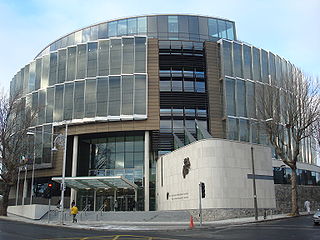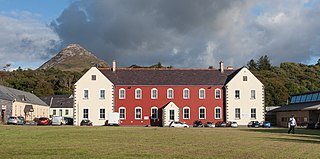Related Research Articles
The Director of Public Prosecutions (DPP) is the office or official charged with the prosecution of criminal offences in several criminal jurisdictions around the world. The title is used mainly in jurisdictions that are or have been members of the Commonwealth of Nations.
The Attorney General of Ireland is a constitutional officer who is the legal adviser to the Government and is therefore the chief law officer of the State. The attorney general is not a member of the Government but does participate in cabinet meetings when invited and attends government meetings. The current attorney general is Rossa Fanning, SC.
Amendments to the Constitution of Ireland are only possible by way of referendum. A proposal to amend the Constitution of Ireland must first be approved by both Houses of the Oireachtas (parliament), then submitted to a referendum, and finally signed into law by the President of Ireland. Since the constitution entered into force on 29 December 1937, there have been 32 amendments to the constitution.

Nora Owen is an Irish former Fine Gael politician who served as Minister for Justice from 1994 to 1997 and Deputy leader of Fine Gael from 1993 to 2001. She served as a Teachta Dála (TD) for the Dublin North constituency from 1981 to 1987 and 1989 to 2002.
In Ireland, the state retains laws that allow for censorship, including specific laws covering films, advertisements, newspapers and magazines, as well as terrorism and pornography, among others. In the early years of the state, censorship was more widely enforced, particularly in areas that were perceived to be in contradiction of Roman Catholic dogma, including abortion, sexuality and homosexuality. The church had banned many books and theories for centuries, listed in the Index Librorum Prohibitorum.

The Special Criminal Court is a juryless criminal court in Ireland which tries terrorism and serious organised crime cases.
The High Court of Ireland is a court which deals at first instance with the most serious and important civil and criminal cases. When sitting as a criminal court it is called the Central Criminal Court and sits with judge and jury. It also acts as a court of appeal for civil cases in the Circuit Court. It also has the power to determine whether or not a law is constitutional, and of judicial review over acts of the government and other public bodies.
Capital murder refers to a category of murder in some parts of the US for which the perpetrator is eligible for the death penalty. In its original sense, capital murder was a statutory offence of aggravated murder in Great Britain, Northern Ireland, and the Republic of Ireland, which was later adopted as a legal provision to define certain forms of aggravated murder in the United States. Some jurisdictions that provide for death as a possible punishment for murder, such as California, do not have a specific statute creating or defining a crime known as capital murder; instead, death is one of the possible sentences for certain kinds of murder. In these cases, "capital murder" is not a phrase used in the legal system but may still be used by others such as the media.

Irishtown is an inner suburb of Dublin, Ireland. It is situated on the southside of the River Liffey, between Ringsend to the north and Sandymount to the south, and is to the east of the River Dodder.

The Courts of Justice Act 1924 was an Act of the Oireachtas that established a new system of courts for the Irish Free State. Among the new courts was the Supreme Court of the Irish Free State, and the first Chief Justice of the Irish Free State was also appointed under the Act.

Dún Laoghaire–Rathdown County Council is the authority responsible for local government in the county of Dún Laoghaire–Rathdown, Ireland. It is one of three local authorities that succeeded the former Dublin County Council on its abolition on 1 January 1994 and one of four councils in the old County Dublin. As a county council, it is governed by the Local Government Act 2001. The council is responsible for housing and community, roads and transportation, urban planning and development, amenity and culture, and environment. The council has 40 elected members. Elections are held every five years and are by single transferable vote. The head of the council has the title of Cathaoirleach (chairperson). The county administration is headed by a Chief Executive, Frank Curran. The county town is Dún Laoghaire. It serves a population of approximately 206,260.
The District Court is the main court of summary jurisdiction in Ireland. It has responsibility for hearing minor criminal matters, small civil claims, liquor licensing, and certain family law applications. It is also responsible for indicting the accused and sending them forward for trial at the Circuit Court and Central Criminal Court.
The Circuit Court of Ireland is an intermediate level court of local and limited jurisdiction which hears both civil and criminal matters. On the criminal side the Circuit Court hears criminal matters tried on indictment with a judge and jury, except for certain serious crimes which are tried in either the Central Criminal Court or the Special Criminal Court. On the civil side the Circuit Court has a considerable parallel jurisdiction — including equitable remedies — with the High Court but normally cannot award damages of more than €75,000. The Circuit Court also hears de novo appeals from the District Court in both civil and criminal matters.
Prostitution in Ireland is legal. However, since March 2017, it has been an offence to buy sex. Third party involvement is also illegal. Since the law that criminalises clients came into being, with the purpose of reducing the demand for prostitution, the number of prosecutions for the purchase of sex increased from 10 to 92 between 2018 and 2020. In a report from UCD's Sexual Exploitation Research Programme the development is called ”a promising start in interrupting the demand for prostitution.”

Capital punishment in the Republic of Ireland was abolished in statute law in 1990, having been abolished in 1964 for most offences including ordinary murder. The last person to be executed by the British state on the island of Ireland was Robert McGladdery, who was hanged on 20 December 1961 in Crumlin Road Gaol in Belfast, Northern Ireland. The last person to be executed by the state in the Republic of Ireland was Michael Manning, hanged for murder on 20 April 1954. All subsequent death sentences in the Republic of Ireland, the last handed down in 1985, were commuted by the President, on the advice of the Government, to terms of imprisonment of up to 40 years. The Twenty-first Amendment of the constitution, passed by referendum in 2001, prohibits the reintroduction of the death penalty, even during a state of emergency or war. Capital punishment is also forbidden by several human rights treaties to which the state is a party.

Industrial schools were established in Ireland under the Industrial Schools (Ireland) Act 1868 to care for "neglected, orphaned and abandoned children". By 1884, there were 5,049 children in such institutions throughout the country. The Act was superseded by the Children Act 1908.

There are a number of sexual offences under the law of England and Wales, the law of Scotland, and the law of Northern Ireland.

Prisons in Ireland are one of the main forms of punishment, rehabilitation, or both for the commission of an indictable offense and other offenses.
The Office of the Director of Public Prosecutions is the principal public agency for conducting criminal prosecutions in the Republic of Ireland. It is led by the Director of Public Prosecutions (DPP).
Patricia Ryan is an Irish judge who has been the President of the Circuit Court since 2019. She was appointed to the Circuit Court in 2002 and was formerly a barrister.
References
- 1 2 "Children Court". Courts Service of Ireland.
- ↑ Children Act 2001, s. 71: Children Court ( No. 24 of 2001, s. 71 ). Enacted on 8 July 2001. Act of the Oireachtas .Retrieved from Irish Statute Book .